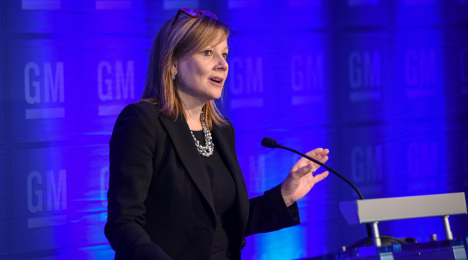Questioning FCA-GM Merger Feasibility

General Motors chief executive officer Mary Barra talks with media prior to the start of the company's annual meeting of stockholders on Tuesday in Detroit. (Photo by Steve Fecht for General Motors)
By subscribing, you agree to receive communications from Auto Remarketing and our partners in accordance with our Privacy Policy. We may share your information with select partners and sponsors who may contact you about their products and services. You may unsubscribe at any time.
CARY, N.C. –
Dealer groups might have both General Motors and Fiat Chrysler Automobiles franchised stores in their portfolio, but what if those competing domestic OEMs united as one to manufacture vehicles for their dealer networks?
Reportedly, that scenario is what FCA chief executive office Sergio Marchionne wants, but at least one industry observer is cautious about the prospect of two of the Big 3 members hitching their collective wagons together.
“A GM-FCA merger doesn’t seem like the most effective use of either company’s assets,” said Karl Brauer, senior analyst for Kelley Blue Book. “Both companies have a strong lineup of trucks and SUVs, which are their largest drivers of sales and profit.
“Furthermore, GM already has an advantage over FCA in terms of successful small cars and hybrid vehicles, and they are finalizing a 200-mile range, fully electric car that will be priced around $35,000,” Brauer continued. “These are areas where FCA is behind GM and would need to invest heavily to catch up.”
On Tuesday morning, a Reuters report surfaced citing sources who originally shared information with the Wall Street Journal. The report indicated Marchionne sent an email message to GM top boss Mary Barra. During a media briefing ahead of a GM annual shareholder meeting, Barra confirmed that Marchionne proposed a merger of the two automakers.
Reuters then reported Barra took Marchionne’s idea to GM’s leadership and it was “very much vetted with management and our board, and after we reviewed that we are committed to our plan … and we have strong support.”
Subscribe to Auto Remarketing to stay informed and stay ahead.
By subscribing, you agree to receive communications from Auto Remarketing and our partners in accordance with our Privacy Policy. We may share your information with select partners and sponsors who may contact you about their products and services. You may unsubscribe at any time.
Later, Barra told the media, according to Reuters’ report that, “We are managing ourselves. We’re focused on our plan.”
Barra’s comments align with Brauer’s assessment of the situation that KBB shared with Auto Remarketing later on Tuesday.
“The Jeep brand is a very desirable asset that any other global automaker, including GM, would like to have, but there's little else FCA can offer GM,” Brauer said.
FCA’s position from the investment community is stable, but Moody’s Analytics questioned the company’s decision to spin off the Ferrari brand. Moody’s last made an analysis of FCA’s situation back in November.
“The sale of FCA’s common shares and issuance of hybrid securities will inject much needed new money to fund the company's 2014-18 business plan,” said Yasmina Serghini-Douvin, a Moody's vice president, senior credit officer and lead analyst on FCA.
“However, we view the spin-off of Ferrari as a credit negative because it will reduce the contribution of FCA’s luxury Brands at a time when the company’s operational performance in Latin America has weakened and it is in the early stages of the implementation of its 2014-18 strategy,” Serghini-Douvin continued.
“FCA’s commitment to eliminate the ring-fencing of Chrysler will complete the integration of Chrysler within the FCA group and ultimately reduce FCA's financial complexity,” she went on to say.
Perhaps if FCA and GM aren’t a good fit together, Brauer speculated about potential partners if Marchionne is truly adamant about the automaker merging with another OEM.
“A merger with a European, Japanese or Korean automaker, including Volkswagen, Honda or Hyundai, would be a much better use of FCA’s assets,” Brauer said.


